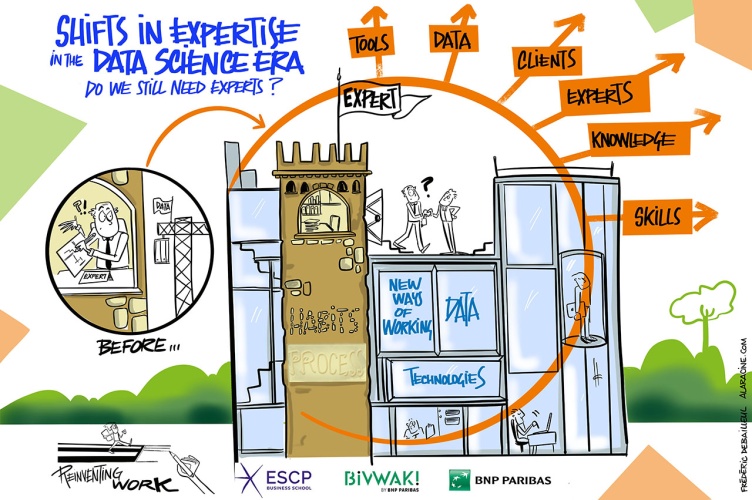Shifts in expertise in the data science era A fascinating project launched in April 2021
Research context
Our research aims at further understanding how multiple forms of expertise are competing within the organisation, in the wake of the data science trend.
Our first phase of field work at BNPP PF revealed the centrality of scoring practices or scores, that is, mathematical models aimed at evaluating customers. These practices are historically embedded in the organisation and have relied since the 1970s on strong mathematical skills, embodied by the Risk teams and their statisticians. However, the spread of data science—through new occupations, new tools and new sets of skills— especially computer science skills— allows a new way to produce scores in the organisation.
Research question
How does the diffusion of data science challenge established forms of expertise in organisations?
Do we still need experts?
Methodology and milestones
Our research had two phases. During the first phase, we led 18 exploratory interviews with 16 Personal Finance employees and observed weekly online meetings for a data science project from June 2021 to January 2022. For the second phase of the research, we focused on Risk teams and added 26 interviews to our sample —with data scientists, scoring and business process experts, and managers.
Research team
- Valentin Mesa (ESCP, Paris campus)
- Géraldine Galindo (ESCP, Paris campus)
Research keytake aways
Data science reframes expertise in organisations, promoting expert work supported by computer science. This happens as a result of data scientists seeking legitimacy in the organisation.
This transformation may not be frictionless, as historical forms of expertise are embedded in the organisation through tools, processes and recognised skills.
Data practices emphasize the role of in-between actors - data workers who operate business software and databases - and whose knowledge and skills are key ingredients for data science.
Finally, as the data science field is still evolving, the division of expert work is still being redefined, with more emerging technologies, occupations and skills. This presents a challenge for HRM in order to adapt talent management practices to maintain the supply of expert work within the organization.
Attention points: Talent management, History-mindful innovation and change.
Key outcomes
Conference papers
■ Mesa, V. (2022). “Famous objects: Studying organizations through the lens of symbolic capital”, 38th EGOS colloquium
■ Mesa, V., & Galindo, G. (2023). “Data scientists tried to come through the window and we closed it: Understanding professional change with symbolic capital”,38th EGOS colloquium
Campuses
